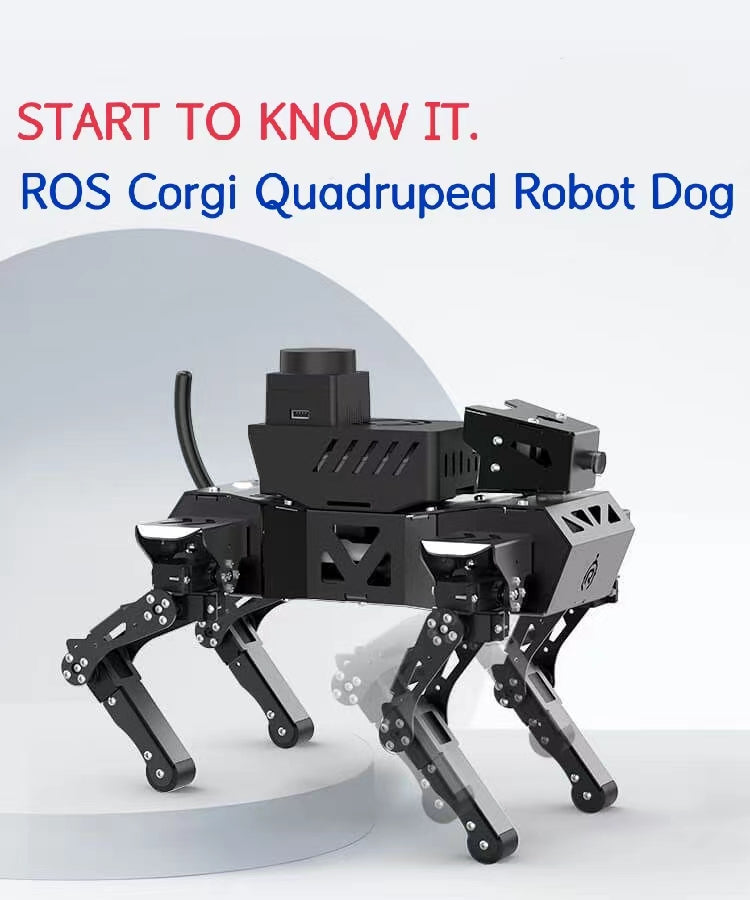XiaoR Corgi ROS SLAM quadruped robot dog is a 13 DOF quadruped bionic robot dog based on ESP32 as the core, through the inverse kinematics algorithms, it can imitate the gait of the natural quadruped dog, which is very interesting.The product realizes wireless remote control through WiFi, using APP for control, you can install the APP to your Android phone, tablet device for control.This product has the function of video image transmission, which can transmit the video images collected by the eyes (camera) of the robot dog to the control terminal for display in real-time.
The robot dog can simulate the front, back, left, right, rotation, translation, squatting, dancing and other movements of real canines, which is very suitable for science museums, science and technology festivals on campus to display science and technology performance activities, robot racing competitions and robot skills competitions and other events.
The product opens the serial port secondary development interface and provides communication protocols, so you can use your own familiar programming language and hardware to control the action of the robot dog through the serial port, for example, you can use the open-source hardware development platform Arduino IDE, which is widely popular among the creators, to carry out secondary development of the robot dog.
The robot dog is equipped with XiaoRGEEK RPI Extend Box, you can experience the visual recognition functions of the robot dog, such as visual recognition of the face, visual recognition of color, visual recognition of QR code, AR virtual reality, gesture control, KCF target recognition, and tracking, etc.; We provide the source code of the above visual functions, you can use the same development method as Raspberry Pi to carry out secondary development of the code.
The robot dog is equipped with TOF high-precision LiDAR, optional depth camera, built-in ROS Melodic system with SLAM and navigation functions and 3D visualization.It is equipped with a 6-axis gyro sensor that senses changes in attitude angle and self-balances the body through the limbs.
This course will start from the basic introduction of robot dog, and then guide you to complete the learning of robot dog's motion control, secondary development environment construction, AI vision programming, ROS-SLAM map navigation function, source code analysis and robot dog kinematics/inverse kinematics knowledge, teaching and learning, so that you can learn valuable robotics knowledge from playing.
|
Number |
Part Name |
Function description |
|
1 |
Camera |
The eyes of the quadruped robot dog are equipped with high-definition cameras, which are used to collect real-time video images and transmit them to the control terminal. |
|
2 |
Aluminum Fuselage |
The shell of the dog is made of aluminum alloy to ensure strength. |
|
3 |
Servo |
Used to control the rotation of each joint of the robot dog, each leg has 3 servos, the head has 1 servo, the whole body has 13 servos. |
|
4 |
Limb Foot |
There are 3 joints to form a set of limbs and feet, the shoulder joints near the body are used to swing up and down, and the other joints are used to swing back and forth. |
|
5 |
Built-in battery |
It is used to supply power to the robot dog system, please do not replace other batteries, or it may cause damage to the circuit. |
|
6 |
Voltage Indicator |
LED voltage display, used to show the voltage and indicate the remaining power, insufficient power needs to be recharged in time. |
|
7 |
Switches |
Used to turn on and cut off the power supply of the robot dog. |
|
8 |
TOF Lidar |
Real-time scanning of the surrounding environment information, complete data collection, and transfer to the ROS main control module. |
|
9 |
Raspberry Pi AI Expansion Box (ROS Master Module) |
Raspberry Pi 4B4G master control, equipped with IMU gyro sensor, is responsible for obtaining laser radar and IMU data and communication with various hardware, and calling ROS function packages to complete the construction of map navigation and other functions. |
|
10 |
Program Download Expansion Box |
Used for ESP32 master serial communication or download. |
|
11 |
Expansion box interface |
You can use this interface to communicate with various expansion modules. |
|
12 |
Charging port |
For battery charging, please use the special charger provided with the product, otherwise the battery may be damaged. |
Robot dog parameters
|
Parameter name |
Parameter details |
|
Dimensions |
229X178X169mm (Standby standing position) |
|
Weight |
1.5kg |
|
Controller |
Dual Harvard Architecture Xtensa LX6 CPU at 240MHz / BCM2711 + Quad-Core Cortex- A72 (ARM V8) 64-bit SOC @ 1.5GHz |
|
Running Memory |
4GB |
|
Freedom |
13 Degrees of Freedom |
|
Interface |
UART/SPI/I2C/PWM/GPIO |
|
Master |
FreeRTOS/Linux |
|
Supply Voltage |
DC 8.4V |
|
Operating current |
9A |
|
Maximum speed |
10cm/sec |
|
Battery capacity |
3000mAh |
|
Standby Time |
7.5 hours |
|
Endurance time |
Normal operating status: 40 minutes; SLAM map building/navigation status: 20 minutes; |
|
Servo Model |
XR-S300 |
|
Charge Time |
7-10 hours |
|
Gait Type |
Trot Gait |
|
Gait Algorithm |
Inverse kinematics solving |
|
Camera Resolution |
480P (body camera) / 1080P (depth camera) |
|
Camera Pixel |
1M (body camera) / 5M (depth camera) |
|
Control Distance |
≤ 20M |
|
Control Method |
WiFi wireless 802.11b/g/n |
|
Control Terminal |
Cell phone, PAD, PC |
|
Programming language |
Arduino C / Python /C++ |


